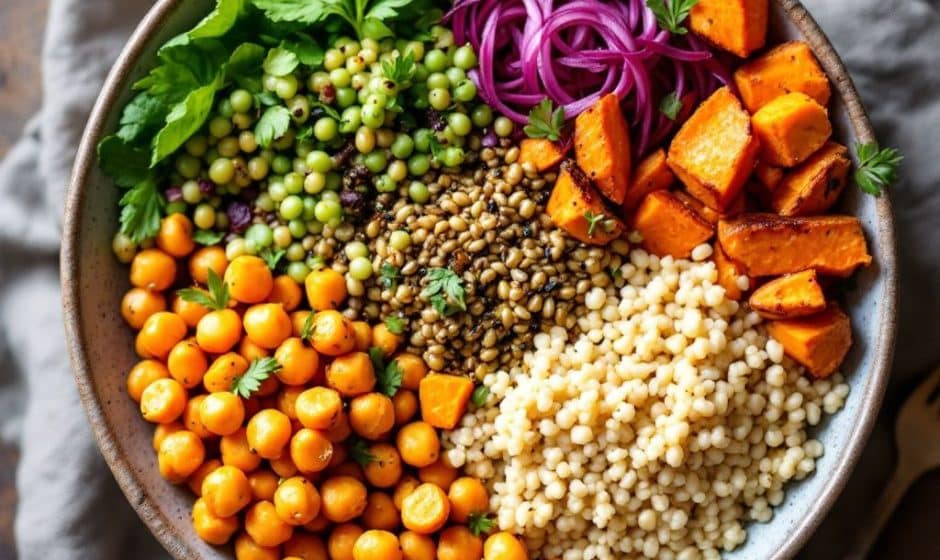Hey there! So you’re curious about how a vegan hormone balancing diet can help support your hormones, huh? Maybe you’re feeling a little off-kilter and suspect that your hormones might be partly to blame. Or perhaps you’re just keen on keeping everything in balance as you dive deeper into the plant-based life. Whatever brought you here, let’s explore together how a diet tailored for hormone support can make a world of difference.
Understanding Hormonal Imbalance
First things first, let’s chat about what hormonal imbalance might look like. You know, those late-night sugar cravings, mood swings that could rival a rollercoaster, or perhaps that stubborn fatigue that just won’t quit? Yep, those can be signs of hormones doing a little dance that’s slightly out of step. Basically, hormones are your body’s chemical messengers—they regulate everything from metabolism to mood, and when they’re not in harmony, life can feel off-balance.
Now for the heart of the matter: a hormone balancing diet. And trust me, it makes all the difference. Diet affects your hormones more than you’d think. What you eat directly influences your hormone production, how they’re utilized, and even how they break down in your body. For those on a vegan journey, knowing how to nail this down with plant-based foods is key.
The Role of a Vegan Diet in Hormonal Health
Switching to a vegan diet often prompts positive changes, not just for ethical and environmental reasons, but also for personal health. Plant-based diets, by nature, are rich in fruits, vegetables, legumes, and grains which are packed with nutrients, fiber, and antioxidants. These can be game-changers for hormonal health.
Plant Foods Mean Hormone Gold
I cannot stress this enough, but the variety in plants is stellar for hormones! Some foods are particularly superstar-level at balancing things out. Cruciferous vegetables like broccoli and kale, for example, can help metabolize estrogen. These bad boys break down these hormones effectively, reducing the risk of estrogen dominance—a common imbalance. And it’s not just veggies; don’t skimp on your fruits, nuts, seeds, and whole grains either.
Key Nutrients for Hormone Balancing
- Omega-3 Fatty Acids: Think flaxseeds, walnuts, and chia seeds. They’re shining examples of plant sources that aid hormone production and have anti-inflammatory effects.
- Zinc: An essential mineral found in pumpkin seeds and chickpeas that supports reproductive hormone health.
- Magnesium: Bananas, cashews, and avocado are all great for this mineral, which helps with stress and sleep—both crucial for maintaining hormonal harmony.
- Fiber: Trust me, fiber does wonders. It aids in hormone detoxification and can prevent spikes in blood sugar levels, keeping insulin—a key hormone—balanced.
Practical Steps Towards a Hormone Balancing Vegan Diet

Alright, so how do we incorporate all this goodness into our lives? We’re diving into practicalities next; consider these steps your blueprint toward hormonal balance on a vegan diet.
Start with a Well-Rounded Breakfast
Breakfast really sets the stage for how your body and hormones function throughout the day. Might I suggest starting with a smoothie? Toss in some spinach, chia seeds, almond milk, and a ripe banana. You get a hit of fiber, protein, and essential fats—all necessary to fuel your hormones effectively.
Snack Wisely and Often
Life’s sweetest (and healthiest) secret is snack time. Snacking on the right foods, like handfuls of nuts or hummus with carrot sticks, helps you maintain consistent energy levels, avoiding that blood sugar rollercoaster that can trip your hormones up.
Fabulous Fiber at Every Meal
Include whole grains like quinoa or brown rice whenever you can. They digest slowly, releasing glucose steadily into your bloodstream, which is music to your insulin’s ears (or receptors, I should say).
Common Pitfalls and How to Avoid Them
Even the best intentions can go sideways sometimes, and guess what? That’s perfectly okay! Knowing what to watch out for can be incredibly helpful.
#1 Misstep: Too Little Protein

Sometimes, vegan diets unwittingly end up low on protein, affecting hormone synthesis negatively. So, aim for a variety of protein sources throughout your week. Tempeh, lentils, and even quinoa can help hit those protein goals. Mix ’em up to keep it interesting!
#2 Overdoing Processed Foods
Vegan doesn’t always mean healthy if you’re overly indulging in processed meat replacements. These are often loaded with additives and lacking in nutrients—options like jackfruit and mushrooms can be soooo much more rewarding in a meal.
#3 Not Drinking Enough Water
Not directly a food issue, but water helps hormones and nutrients do their thing efficiently. Plus, it helps transport fiber effectively, assisting the balance you’re striving for.
Listen to Your Body
While general advice is helpful, your body’s whispers (and sometimes, shouts) always trump it. Cravings, energy dips, skin breakouts—your body’s trying to tell you something, often about your hormones.
Pay attention to patterns, and with each tweak you make—like adding more omega-rich seeds or cutting back on sugar—observe how you feel. These emotions and physical sensations? They’re breadcrumbs leading you to the solutions your body might be yearning for.
Give it Time
Adaptations to a new diet don’t happen overnight. It can take weeks, sometimes months to see full results. Be easy on yourself. If you make gradual changes, they’ll more likely stick and create lasting, positive impacts.
Incorporate Relaxation and Mindfulness
Let’s sprinkle in a bit of info not fully related to dietary intake but oh-so-important to mention. Being in tune with your body also means recognizing when it needs rest and relaxation. Stress drastically affects hormones. Trust me, fitting in time for yoga, meditation, or even heartwarming belly laughs between good friends can do wonders for keeping everything in balance.

Finding Your Groove: A Sample Meal Plan
Here’s a ballpark idea for how a day dedicated to vegan hormone support could look. Feel free to mix and swap based on your favorite flavors.
- Breakfast: Avocado toast on whole-grain bread with a sprinkle of hemp seeds.
- Morning Snack: A handful of almonds and fresh berries.
- Lunch: Buddha bowl with quinoa, roasted chickpeas, sweet potatoes, and a medley of colorful veggies drizzled with tahini sauce.
- Afternoon Snack: An apple with almond butter.
- Dinner: Stir-fry with tofu, broccoli, snow peas, and bell peppers served over brown rice.
- Dessert: Dark chocolate with a couple of strawberries (because balance, right?).
There you go! A well-rounded, diverse day full of nutrients to help keep those precious hormones in line.
Continued Learning and Support
Remember to keep learning and seeking out vegan hormone tips that could work for you. We’re all different, and what works for one might not for another. Books, podcasts, and community groups are incredible resources.
In conclusion, embracing a vegan hormone balancing diet is about so much more than restriction—it’s about nurturing your body’s complex systems and finding harmony. Enjoy the vibrant colors on your plate, relish the flavors, and trust that these simple yet powerful shifts can unlock a greater sense of wellbeing.
Final Thoughts
Whether you’re brand new to veganism or food was already your love language, focusing on hormone balancing introduces a fresh twist to your routine. Keep the key points in mind, like choosing diverse, nutrient-packed foods and practicing relaxation techniques. Exploring all these flavors and establishing gut-friendly habits creates a ripple effect where you’ll feel fuller of energy, grounded, and harmonious. Go on, embark on this tasty adventure and see what shifts for you!
Frequently Asked Questions
What is a hormone balancing diet?
A hormone balancing diet is a nutritional approach designed to support and regulate the body’s hormonal balance. It typically involves consuming nutrient-rich whole foods, such as fresh fruits, vegetables, whole grains, lean proteins, and healthy fats, to optimize hormone production and function. This diet aims to enhance metabolic efficiency, improve mood and energy levels, reduce the risk of chronic diseases, and support reproductive and overall health[2][3][5).
What foods should I include in a hormone balancing diet?
Foods that support hormone balance include lean proteins like chicken, eggs, and wild-caught fish; vegetables and most fruits; chia seeds, flaxseeds, and most nuts; olive oil and other unsaturated oils; and whole grains like buckwheat, brown rice, and quinoa. Additionally, foods rich in omega-3 fatty acids (such as fatty fish), cruciferous vegetables (like broccoli and Brussels sprouts), and root vegetables (like sweet potatoes) are beneficial. Berries, green tea, and probiotics also play a significant role in maintaining hormonal balance[1][3][4).
What foods should I avoid on a hormone balancing diet?
Foods to avoid or minimize include caffeine, alcohol, fried foods, processed meats, peanuts, saturated fats, full-fat dairy, artificial sweeteners, and simple high-glycemic carbohydrates like white bread. These foods can disrupt hormone balance and lead to various health issues[1][3][4).
How can a hormone balancing diet improve my overall health?
A hormone balancing diet can enhance metabolic efficiency, improve mood and energy levels, reduce the risk of chronic diseases such as type 2 diabetes and certain cancers, and support reproductive health. It also helps in regulating stress hormones, improving skin health, and maintaining a healthy gut microbiome, all of which contribute to overall well-being[2][3][5).
References



